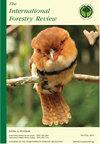Sustainability Certification and Legality Verification in Indonesian Natural Forest-Based Wood Products Value Chains
IF 0.9
4区 农林科学
Q2 FORESTRY
引用次数: 2
Abstract
HIGHLIGHTS The case study natural forest-based value chains were largely compliant with the Indonesian timber legality verification system (SVLK). SVLK includes sustainability requirements (PHPL), but these are less stringent than voluntary forest certification, primarily because of a lesser emphasis on field performance. SVLK fostered legality compliance in both domestic and export value chains, but some loopholes remain. Weaknesses in SVLK architecture and implementation impact on both sustainability and legality of Indonesian natural forest-based value chains. This study suggests five areas for improvement of SVLK. SUMMARY Indonesian natural forest concessions and value chains are governed by a mandatory Timber Legality Verification System (SVLK), which includes assessment of Sustainable Production Forest Management (PHPL). Concessionaires and processors may also pursue voluntary forest certification. This study explores actors' compliance with these instruments along wood product value chains originating primarily from natural forests. Empirical results demonstrate that SVLK fostered legality compliance in domestic as well as export value chains, but still allows some possible loopholes. It is easier for actors to comply with SVLK than with Forest Stewardship Council (FSC) certification, because SVLK has less stringent requirements, and uses an assessment system that allows poor field performance and does not foster continuous improvement of practices. These results identify weaknesses in the architecture and implementation of the regulatory instruments, and suggest measures to strengthen Indonesia's sustainable forest management and timber legality systems.印尼天然林木制品价值链的可持续性认证和合法性验证
亮点以天然林为基础的价值链案例研究在很大程度上符合印度尼西亚木材合法性核查系统(SVLK)。SVLK包括可持续性要求(PHPL),但这些要求不如自愿森林认证严格,主要是因为对实地表现的重视程度较低。SVLK促进了国内和出口价值链的合法合规性,但仍存在一些漏洞。SVLK架构和实施方面的薄弱环节影响了印尼天然林价值链的可持续性和合法性。本研究提出了改善SVLK的五个方面。印尼天然林特许权和价值链受强制性木材合法性验证系统(SVLK)的管辖,该系统包括对可持续生产森林管理(PHPL)的评估。特许经营者和加工者也可以寻求自愿的森林认证。这项研究探讨了主要来源于天然林的木材产品价值链中行为者对这些文书的遵守情况。实证结果表明,SVLK促进了国内和出口价值链的合法合规性,但仍存在一些可能的漏洞。与森林管理委员会(FSC)认证相比,行动者更容易遵守SVLK,因为SVLK的要求不那么严格,并且使用的评估系统允许较差的实地表现,并且不能促进实践的持续改进。这些结果确定了监管文书的结构和执行方面的薄弱环节,并提出了加强印度尼西亚可持续森林管理和木材合法性制度的措施。
本文章由计算机程序翻译,如有差异,请以英文原文为准。
求助全文
约1分钟内获得全文
求助全文
来源期刊

International Forestry Review
农林科学-林学
CiteScore
2.50
自引率
6.20%
发文量
29
审稿时长
>36 weeks
期刊介绍:
The International Forestry Review is a peer-reviewed scholarly journal that publishes original research and review papers on forest policy and science, with an emphasis on issues of transnational significance. It is published four times per year, in March, June, September and December. Special Issues are a regular feature and attract a wide audience. Click here for subscription details.
 求助内容:
求助内容: 应助结果提醒方式:
应助结果提醒方式:


